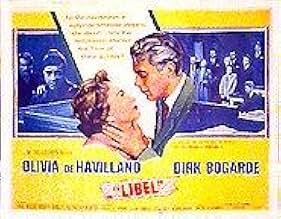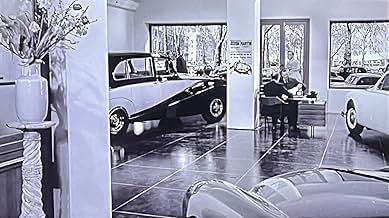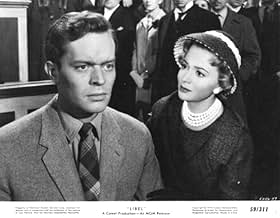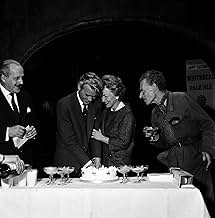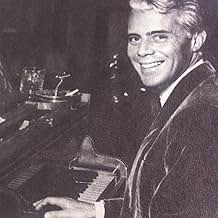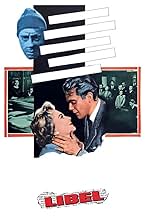AVALIAÇÃO DA IMDb
7,2/10
1,7 mil
SUA AVALIAÇÃO
Um veterano da Segunda Guerra Mundial em estado de choque e com problemas de memória é acusado de ser um impostor por um antigo camarada.Um veterano da Segunda Guerra Mundial em estado de choque e com problemas de memória é acusado de ser um impostor por um antigo camarada.Um veterano da Segunda Guerra Mundial em estado de choque e com problemas de memória é acusado de ser um impostor por um antigo camarada.
- Direção
- Roteiristas
- Artistas
- Indicado a 1 Oscar
- 1 indicação no total
Wilfrid Hyde-White
- Foxley
- (as Wilfrid Hyde White)
- Direção
- Roteiristas
- Elenco e equipe completos
- Produção, bilheteria e muito mais no IMDbPro
Avaliações em destaque
This movie employs good actors, particularly some of the great English character actors of the time. However, the premise of the plot- one person changing identities with another, ruined the movie for me. What I don't understand, and wish some other movie buff could explain, how do writers get paid for stories when they show an complete lack of basic understanding of the military. Even way back in WWII, English soldiers were fingerprinted, and most soldiers wore their dog tags religiously, particularly those who served in combat. I would imagine a baron would be particularly concerned that his remains arrive back in the family plot. These two facts of military life were never explained. The final insult to our intelligence came when a uniform of a near comatose patient is presented in the court room. Since the war ended in 1945, and the setting of the movie was contempory (1959), 14 years had elapsed. What happened to the soldier's identification tags? What efforts had been made to notify the patient's family? In real life, the question of responsibility would have generated a search to determine whether the patient was a British soldier. The two main characters were captured at the evacuation at Dunkirk, often referred as the Miracle of Dunkirk because 400,000 soldiers did excape. The number of majors captured at Dunkirk would have been relatively small, and if a hospital was stuck with a patient for long term care, it stands to reason a serious effort would be made to determine who their patient was.
Libel is directed by Anthony Asquith and adapted from Edward Wooll's play by Anatole de Grunwald and Karl Tunberg. It stars Dirk Bogarde, Olivia de Havilland, Paul Massie, Robert Morley, Wilfrid Hyde-White, Anthony Dawson and Richard Wattis. Music is by Benjamin Frankel and cinematography by Robert Krasker.
A shell-shocked ex-WWII prisoner of war with amnesia is accused of being an impostor by one of the guys he was imprisoned with. This sends him spinning into the middle of a Libel court case that could destroy everything in his life.
A splendidly stylish mystery/drama that offers up two Dirk Bogarde's for the price of one. The big question throughout is if Bogarde, in the shoes of Sir Mark Sebastian Loddon, is actually a doppleganger that he was in the war with called Frank Welney. Loddon has the riches, the estate and a beautiful loving wife, Welney was a struggling actor and something of a mischievous imp. The big narrative thrust is that Loddon is not sure himself, he can only remember certain things, thus we are never sure either as the plot twists and turns and the court case simmers away with dramatic force.
Bogarde is great in his dual role, with a voice change for each character and different hair styles to help the viewers differentiate. In the court we have a trio of classy character actors, with Hyde- White and Morley as the opposing lawyers (wonderful to witness this) and Watiss as the judge presiding over the trial. Havilland isn't asked to do much until late in the day, but then she shines bright and puts some emotional punch into proceedings. The great Krasker photographs it in crisp black and white, while Asquith directs with a smoothness that undercuts the coincidences and conveniences that exist in this sort of story.
All the highlights of a court room drama are here, and it's a cracking mystery to boot. 8/10
A shell-shocked ex-WWII prisoner of war with amnesia is accused of being an impostor by one of the guys he was imprisoned with. This sends him spinning into the middle of a Libel court case that could destroy everything in his life.
A splendidly stylish mystery/drama that offers up two Dirk Bogarde's for the price of one. The big question throughout is if Bogarde, in the shoes of Sir Mark Sebastian Loddon, is actually a doppleganger that he was in the war with called Frank Welney. Loddon has the riches, the estate and a beautiful loving wife, Welney was a struggling actor and something of a mischievous imp. The big narrative thrust is that Loddon is not sure himself, he can only remember certain things, thus we are never sure either as the plot twists and turns and the court case simmers away with dramatic force.
Bogarde is great in his dual role, with a voice change for each character and different hair styles to help the viewers differentiate. In the court we have a trio of classy character actors, with Hyde- White and Morley as the opposing lawyers (wonderful to witness this) and Watiss as the judge presiding over the trial. Havilland isn't asked to do much until late in the day, but then she shines bright and puts some emotional punch into proceedings. The great Krasker photographs it in crisp black and white, while Asquith directs with a smoothness that undercuts the coincidences and conveniences that exist in this sort of story.
All the highlights of a court room drama are here, and it's a cracking mystery to boot. 8/10
Dirk Bogarde was a marvelous actor, and this is a fine film. But if you insist on believable stories, you won't like it. It's as true to life as an Agatha Christie story, and just as entertaining.
The plot is this: An English lord and a penniless scoundrel who looks exactly like him are in the same POW camp during World War II. Years later, another veteran claims the scoundrel actually killed the aristocrat and has been impersonating him ever since. The whole thing winds up in court, putting the aristocrat's wife through some agonizing moments. Finally, when nobody can stand the suspense any longer, the truth is revealed.
The idea of someone meeting his exact double is as silly as it is unbelievable, and by the 1950s there were ways to verify whether a living man was the war veteran he claimed to be. So you can't take this seriously. But if you suspend disbelief, you will really enjoy it. Though it's not marketed as a mystery, it's ideal for mystery fans.
I had to talk my wife into watching this movie on TCM, because it looked to her like a gloomy psychological drama. Once she started watching, she couldn't turn away (especially when Dirk Bogarde was on the screen). She was still talking about it an hour after it ended. "What if something like that really happened?" she remarked. Well, it wouldn't, but ...
The plot is this: An English lord and a penniless scoundrel who looks exactly like him are in the same POW camp during World War II. Years later, another veteran claims the scoundrel actually killed the aristocrat and has been impersonating him ever since. The whole thing winds up in court, putting the aristocrat's wife through some agonizing moments. Finally, when nobody can stand the suspense any longer, the truth is revealed.
The idea of someone meeting his exact double is as silly as it is unbelievable, and by the 1950s there were ways to verify whether a living man was the war veteran he claimed to be. So you can't take this seriously. But if you suspend disbelief, you will really enjoy it. Though it's not marketed as a mystery, it's ideal for mystery fans.
I had to talk my wife into watching this movie on TCM, because it looked to her like a gloomy psychological drama. Once she started watching, she couldn't turn away (especially when Dirk Bogarde was on the screen). She was still talking about it an hour after it ended. "What if something like that really happened?" she remarked. Well, it wouldn't, but ...
Sir Mark Loddon has been having a hard time of it since he returned from WWII. He was in a German prison camp and then was injured badly during his escape. Everyone, including himself, assumes that his emotional state and spotty memory of things that happened before his escape are due to his wartime trauma. We call it PTSD now, they called it "shell shock" back in the day. He's subject to night terrors and he is always seeing some terrifying reflection in mirrors, water, whatever.
And then along comes somebody from his past, Jeffrey Buckenham, who escaped with Loddon. Buckenham is saying that Loddon is in fact an impoverished actor named Frank Wellney who could have passed for Loddon as far as looks go and who was always trying to find out personal details about Loddon and impersonating him. Wellney, along with he and Loddon, escaped the prison camp together. The three got separated, and (from a great distance) Buckenham witnessed what he believes is the aftermath of the murder of one body double by the other. Only after seeing Loddon on a TV program about famous English castles and noticing that Loddon has the same finger missing as Wellney had has Buckenham decided to come forward with his suspicions.
Buckenham doesn't want blackmail money. Instead, he wants to expose Wellney for the fraud that he is. Buckenham goes to a local newspaper and tells them his tale and the paper prints it, with a great deal of publicity being stirred up since Loddon is quite wealthy and owner of a large manor. Loddon wants to ignore the whole thing and let it blow over, but his wife, Margaret (Olivia De Haviland), says they must sue the paper and Buckenham for libel as otherwise this scandal would always hang over their son. So Loddon becomes a reluctant plaintiff. But why is he so reluctant?
Thus the rest of the film is a courtroom drama with lots of interesting turns including a surprise witness with a story that turns out to have a kind of Frankenstein monster twist to it. The really interesting part of the plot's dynamics is that Loddon was so terribly wounded and shell-shocked in the aftermath of the escape that he himself begins to doubt who he is and what exactly he has done to the missing Mark Loddon, if he in fact is not Mark Loddon himself.
The casting is wonderful. De Haviland is great as a woman who at first completely believes in her husband, but after all of this testimony is beginning to have doubts. Wilfred Hyde-White and Robert Marley are the clever barristers. Anthony Dawson plays Mark's sly cousin who would inherit the entire Loddon estate if it can be proved that the person claiming to be Mark Loddon is an imposter. Finally there is Dirk Bogarde who convincingly plays both the aristocratic Loddon and the oily Wellney as two very different types of people, and also excels at playing whoever the troubled person is sitting next to Olivia De Haviland in the courtroom.
And then along comes somebody from his past, Jeffrey Buckenham, who escaped with Loddon. Buckenham is saying that Loddon is in fact an impoverished actor named Frank Wellney who could have passed for Loddon as far as looks go and who was always trying to find out personal details about Loddon and impersonating him. Wellney, along with he and Loddon, escaped the prison camp together. The three got separated, and (from a great distance) Buckenham witnessed what he believes is the aftermath of the murder of one body double by the other. Only after seeing Loddon on a TV program about famous English castles and noticing that Loddon has the same finger missing as Wellney had has Buckenham decided to come forward with his suspicions.
Buckenham doesn't want blackmail money. Instead, he wants to expose Wellney for the fraud that he is. Buckenham goes to a local newspaper and tells them his tale and the paper prints it, with a great deal of publicity being stirred up since Loddon is quite wealthy and owner of a large manor. Loddon wants to ignore the whole thing and let it blow over, but his wife, Margaret (Olivia De Haviland), says they must sue the paper and Buckenham for libel as otherwise this scandal would always hang over their son. So Loddon becomes a reluctant plaintiff. But why is he so reluctant?
Thus the rest of the film is a courtroom drama with lots of interesting turns including a surprise witness with a story that turns out to have a kind of Frankenstein monster twist to it. The really interesting part of the plot's dynamics is that Loddon was so terribly wounded and shell-shocked in the aftermath of the escape that he himself begins to doubt who he is and what exactly he has done to the missing Mark Loddon, if he in fact is not Mark Loddon himself.
The casting is wonderful. De Haviland is great as a woman who at first completely believes in her husband, but after all of this testimony is beginning to have doubts. Wilfred Hyde-White and Robert Marley are the clever barristers. Anthony Dawson plays Mark's sly cousin who would inherit the entire Loddon estate if it can be proved that the person claiming to be Mark Loddon is an imposter. Finally there is Dirk Bogarde who convincingly plays both the aristocratic Loddon and the oily Wellney as two very different types of people, and also excels at playing whoever the troubled person is sitting next to Olivia De Haviland in the courtroom.
Updated to make the protagonists be World War II veterans instead of World War I, Libel made its Broadway debut in 1935 after a run in London and ran for 159 performances during the 1935-36 season. Playing the role Dirk Bogarde does here was the screen's original Dr. Frankenstein, Colin Clive.
As for Bogarde due to movie screen magic he gets to play two roles, the respected titled English Lord with American wife Olivia DeHavilland and a Canadian fellow prisoner of war who was a traveling player and who looks like him. Worse than that, we see in flashback how he envied him.
Into their happy lives intrudes another former POW Paul Massie who knew both men in the camp and makes the startling accusation that the one stole the identity of the other who died during the war. This indeed is a case of Libel and one for the courts to straighten out.
Bringing the suit on Bogarde's behalf is Robert Morley and defending Massie is Wilfrid Hyde-White, they make a fine pair of antagonists. What is the truth, for that you have to watch Libel.
Though Olivia is first billed, the film clearly belongs to Dirk Bogarde who delivers a fine poignant performance of a man tortured by doubt, there are things tucked away in his mind that he prefers not dealing with. Olivia gets her innings in when even she starts to doubt the identity of the man she's been married to.
This film also gives we Yanks a chance to see Richard Dimbleby who was a combination of Edward R. Murrow and Walter Cronkite, that kind of trusted voice of the British Empire for the BBC. In fact Dimbleby is hosting Bogarde and DeHavilland on a tour of their mansion when Massie spots them on a bar television and sets everything in motion.
Libel holds up very well today it could probably be easily remade for something like the Iraq or Afghan war in about 15 years time.
As for Bogarde due to movie screen magic he gets to play two roles, the respected titled English Lord with American wife Olivia DeHavilland and a Canadian fellow prisoner of war who was a traveling player and who looks like him. Worse than that, we see in flashback how he envied him.
Into their happy lives intrudes another former POW Paul Massie who knew both men in the camp and makes the startling accusation that the one stole the identity of the other who died during the war. This indeed is a case of Libel and one for the courts to straighten out.
Bringing the suit on Bogarde's behalf is Robert Morley and defending Massie is Wilfrid Hyde-White, they make a fine pair of antagonists. What is the truth, for that you have to watch Libel.
Though Olivia is first billed, the film clearly belongs to Dirk Bogarde who delivers a fine poignant performance of a man tortured by doubt, there are things tucked away in his mind that he prefers not dealing with. Olivia gets her innings in when even she starts to doubt the identity of the man she's been married to.
This film also gives we Yanks a chance to see Richard Dimbleby who was a combination of Edward R. Murrow and Walter Cronkite, that kind of trusted voice of the British Empire for the BBC. In fact Dimbleby is hosting Bogarde and DeHavilland on a tour of their mansion when Massie spots them on a bar television and sets everything in motion.
Libel holds up very well today it could probably be easily remade for something like the Iraq or Afghan war in about 15 years time.
Você sabia?
- CuriosidadesThe original Broadway production of "Libel", produced in 1935, was directed by Otto Preminger, years before he made his Hollywood debut as a movie director.
- Erros de gravaçãoIn opening credits, Arthur Davey is listed as In Charge of Adminstration; no way of missing the obvious error - it takes up half the screen; of course, it should be Administration. How can such glaring errors be missed by editors.
- ConexõesReferences Apasionada (1952)
Principais escolhas
Faça login para avaliar e ver a lista de recomendações personalizadas
- How long is Libel?Fornecido pela Alexa
Detalhes
- Data de lançamento
- Países de origem
- Idiomas
- Também conhecido como
- Libel
- Locações de filme
- Piccadilly Circus, Piccadilly, Londres, Inglaterra, Reino Unido(opening scenes, establishing shot)
- Empresa de produção
- Consulte mais créditos da empresa na IMDbPro
Bilheteria
- Orçamento
- US$ 615.000 (estimativa)
- Tempo de duração1 hora 40 minutos
- Cor
- Mixagem de som
- Proporção
- 2.00 : 1
Contribua para esta página
Sugerir uma alteração ou adicionar conteúdo ausente

Principal brecha
By what name was A Noite é Minha Inimiga (1959) officially released in India in English?
Responda
